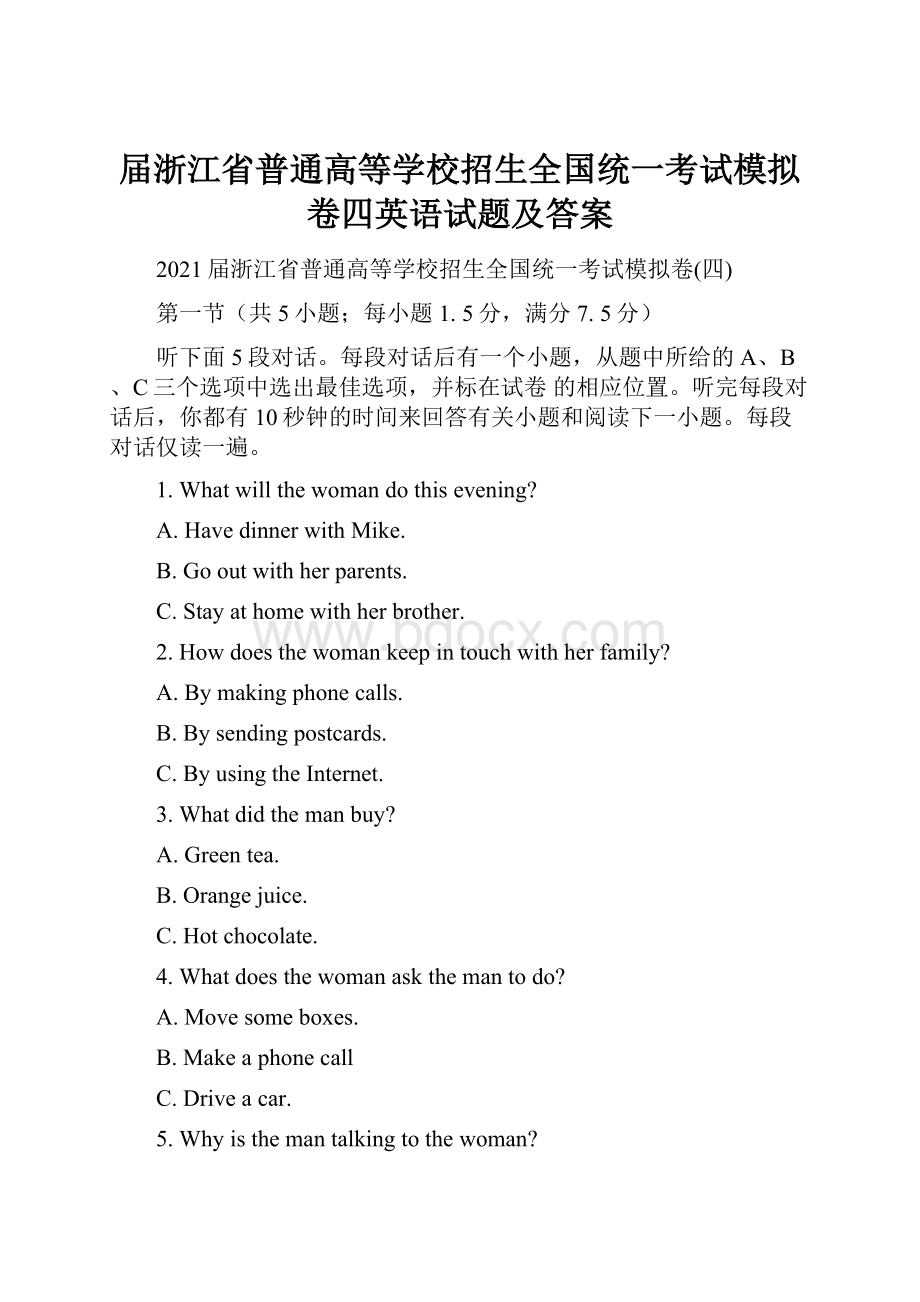届浙江省普通高等学校招生全国统一考试模拟卷四英语试题及答案.docx
《届浙江省普通高等学校招生全国统一考试模拟卷四英语试题及答案.docx》由会员分享,可在线阅读,更多相关《届浙江省普通高等学校招生全国统一考试模拟卷四英语试题及答案.docx(15页珍藏版)》请在冰豆网上搜索。

届浙江省普通高等学校招生全国统一考试模拟卷四英语试题及答案
2021届浙江省普通高等学校招生全国统一考试模拟卷(四)
第一节(共5小题;每小题1.5分,满分7.5分)
听下面5段对话。
每段对话后有一个小题,从题中所给的A、B、C三个选项中选出最佳选项,并标在试卷的相应位置。
听完每段对话后,你都有10秒钟的时间来回答有关小题和阅读下一小题。
每段对话仅读一遍。
1.Whatwillthewomandothisevening?
A.HavedinnerwithMike.
B.Gooutwithherparents.
C.Stayathomewithherbrother.
2.Howdoesthewomankeepintouchwithherfamily?
A.Bymakingphonecalls.
B.Bysendingpostcards.
C. ByusingtheInternet.
3.Whatdidthemanbuy?
A.Greentea.
B. Orangejuice.
C.Hotchocolate.
4.Whatdoesthewomanaskthemantodo?
A.Movesomeboxes.
B.Makeaphonecall
C.Driveacar.
5.Whyisthemantalkingtothewoman?
A.Totakeoutinsurance.
B.Todescribehisillness.
C. Tomakeanappointment.
第二节(共15小题;每小题1.5分,满分22.5分)
听下面5段对话或独白。
每段对话或独白后有几个小题,从题中所给的A、B、C三个选项中选出最佳选项。
听每段对话或独白前,你将有时间阅读各个小题,每小题5秒钟;听完后,各小题将给出5秒钟的作 答时间。
每段对话或独白读两遍。
听第6段材料,回答第6、7题。
6. Wheredoestheconversationtakeplace?
A.Inahotel.
B.Intheman’soffice.
C. Inapostoffice.
7.Whatwillthemandonext?
A.Postsomepapers.
B.Findafaxmachine.
C.Godownstairs.
听第7段材料,回答第8至10题。
8. Wheredidthemanmostprobablylosehisphone?
A.Ontheunderground.
B.Inabank.
C.Inarestaurant.
9.Whatwillthemandobeforefiveo’clock?
A.Buyanewphone.
B.Makeacalltothewoman.
C.Meetthewoman.
10.Howdoesthemanfeelintheend?
A.Surprised.
B. Grateful.
C.Doubtful.
听第8段材料,回答第11至13题。
11.Howdidthewomanbookthemovietickets?
A.OntheInternet.
B.Attheticketoffice.
C.Onthephone.
12.WhendidthespeakersplantomeettheSmithsatfirst?
A.At11:
30. B. At12:
00. C. At2:
00.
13.Wherewillthespeakersgofirst?
A.Tothecinema.
B. Totherestaurant.
C. Tothebookstore.
听第9段材料,回答第14至17题。
14.WhatdoesthemanthinkofLucy5stakingflyinglessons?
A.Impractical. B. Surprising. C. Interesting.
15.WhatisLucy?
A.Apilot.
B. Anurse.
C. Adoctor.
16.Whatdoesthemanadvise thewomantodo?
A.Teachinacollege.
B.Startherownrestaurant.
C. OrganizeanItaliancookingclass.
17.Whatistherelationshipbetweenthespeakers?
A.Husbandandwife.
B.Brotherandsister.
C.Teacherandstudent.
听第10段材料,回答第18至20题。
18.Whoisthespeaker?
A.AnEnglishteacher.
B.Auniversitystudent.
C.Anewsreporter.
19.Whatdoesthespeakersuggest?
A.Practicinglisteningmoreafterclass.
B.Tryingtounderstandeverywordwhenlistening.
C.Listeningtopopsongswithoutreadingthewords.
20.Whatisthespeakermainlytalkingabout?
A.Howtounderstandteachersbetter.
B. Howtofindinterestingmaterials.
C.HowtoimproveEnglishlistening.
第二部分阅读理解(共两节,满分35分)
第一节(共10小题;每小题2.5分,满分25分)
阅读下列短文,从每题所给的A、B、C和D四个选项中,选出最佳选项,并在答题纸上将该项涂黑。
A
Whenwespeaktootherpeople,theyarenotonlylisteningtoouractualwords,butsensingourfacialexpression,toneofvoice,gestures,levelofeyecontact,posture,andmovementsaswell.Nonverbal communication,orbodylanguage,makesupapproximately65percentofhumancommunication.Body languagehasamajorimpactonhowothersperceivewhatwesay.Itcanalsobeatoolformiscommunicationwhen thespeakerandlistenerarefromdifferentculturesorarecommunicatingthroughtechnologythatdeprivesthemof visioncues.Infact,weoftenrealizetheimportanceofbodylanguageonlywhenwecannotinterpret someoneelse’sbodylanguagecorrectly.
InEyetoEye:
HowPeopleInteract,Dr.PeterMarshexplainsthatbeforewespeak,ourgestures,posture,andfacialexpressionsarealreadybroadcastingmessagestothosearoundus.Whilewearespeaking,thesegesturescontinuetocommunicatemessages-usuallyclarifyingwhatwearesaying,butsometimescontradictingusintelltaleways.
Often,bodylanguageisanunconsciousactthattriggersthemostdevelopedsensesinotherpeople-hearingandsight.Thatiswhybodylanguageissuchagreatwaytoemphasizewordsandideas.Manypeopletakeadvantageofthis.Advertisers,forexample,castactorsintheircommercialswhousebodylanguagethatappealstoviewers.
Studieshaveshownthatpeopledbodylanguagechangeswhentheyarenottellingthetruth.Ifsomeone’sbodylanguageisinconsistentwithwhatheorsheissaying,peopletendtobelievewhatthe bodyistellingthem.Agoodwayforpeopletoconveyapositivemessageistoavoidcertain movements,likefidgetingorlettingyoureyeswander.Instead,goodcommunicatorsmaintainsteady eyecontact,nodinagreement,andsmile.Youmaynoticethatpeopleontelevision,likehostsof infomercialsandtalk-shows?
generallydisplaythispositivelanguagewhenspeaking.
21.Thetextmainlyfocusesonthe ______________ofthebodylanguage.
A.development B.significance
C. examples D.acquirement
22.WhatisthemainpurposeofParagraph2?
A.Toattractreaderstogoonreading.
B.TohelpreadersknowaboutDr.Marshandencouragethemtoreadhisbook.
C.Toofferaresearchtosupportthewriter’sstatement.
D.Tointroduceadifferentviewpointfromthewriter’s.
23.Theunderlinedword fidgeting mostprobablymeansmakingsmallmovementsofhandsandfeet,becauseoffeeling______________.
A.pleased B.sad C. satisfied D.nervous
B
Someparentsworrykidsspendalotoftimelookingatscreens.Butanewstudyarguesagainstthatuneaseparentsmayfeel.“Thedangeristhatthey’rehearingamessagethatsocialmediauseis causingveryseriousandharmfulproblemslikedepressionandanxiety.CandiceOdgers,professorat theUniversityofCalifornia,explained. aAndtheideaisthatifyoushutoffsocialmedia,whichlotsof kidsusetoconnectwitheachotherandfindoutinformation,youcouldinfactbemakingasituation worse.”
Odgersandhercolleagueslookedatthescreen-relatedbehaviorof400public-schoolstudentsinNorthCarolinaaged10to14.Theresearchersfoundthat—evennotcountingtimedoingschoolworkon screens—thekidsspentbetweenalmost5hoursto7hoursperdayontheirdevices.“Overall,whatwe findisnoconnectionbetweentheamountoftimethatyoungpeoplespendonlineandmentalhealth symptomslikedepression,anxiety”.Whattheyactuallyfoundwassomethingjaw-dropping.Young peoplewhosentmoretextmessagesreportedbettermentalhealth.Odgerswasnotalonethere.Journal ClinicalPsychologicalSciencerecentlyannounced,“peoplewhousetechnologyinthepositivewaysto stayconnectedoff-lineoften,aremoreconnectedonlineaswellandexperiencingbettermentalhealth.”
Sowhyarethefearsaboutscreentime?
Odgersarguesthatthemethodologies(方法论)forolderstudiesmayhaveledtofalseconclusions.“Oneofthemethodsthat’sbeendonetodatehasbeenasking studentstorecall 6 Howoftenareyouonline?
?
and 6 Haveyoueverfeltdepressed?
?
Andthecorrelation betweenthosetwothingshasbeenusedtospreadalotoffearaboutthisconnectionbetweensocial mediauseandthingslikedepression,99.5percentofthereasonsthatkidsdifferintheirdepressionis duetosomethingotherthanthetimetheyspendonlinethough.”
Parentsgetalotofadvice,andsomeofitalwaysseemstoconflict.“Thehopeisthatmoreparentswillhearthismessageandrelaxandspendkindoflesstimeworryingaboutsmartphonesandmoretime justtalkingtotheirkids.”
24.Wheremightthispassagebetakenfrom?
A.ATravelJournal.
B.ANewspaperFrontpage.
C.ANursingandParentingMagazine.
D.APsychologyandEducationMagazine.
25.Whatdidresearchersfindaboutthescreen-relatedbehaviorofstudentsatschool?
A.Themoretimestudentsspentonline,thebettermentalhealththeyreported.
B.StudentsinNorthCarolinaaged10to14spenttoomuchtimeonline.
C.Students’ stayingonlinepositivelyactuallyhelpedwithbettermentalhealth.
D.Shuttingoffsocialmediamadethingsworseintheend.
26.WhichofthefollowingwillOdgersprobablyagreewithaccordingtoparagraph3?
A.Thereistoomuchfearaboutscreentimeamongpeople.
B.Studentshavebeenaskedimproperquestionsaboutscreentime.
C.Noneofthestudents5 depressionhassomethingtodowithscreentime.
D.Thepresentstudiesarebetterthantheolderones.
C
Takeaquicktipple(酒)andyoucouldfindyourselfspeakingasecondlanguagemorenaturally,accordingtoanewresearch.Theforeignlanguageskillsofparticipantsinthestudywerefoundtobe improvedafteradrinkofalcohol,whichsuggeststhewayalcoholcanputusatease outweighs the negativeeffectsonourbrain—atleastforthefirstdrink,anyway.Theinternationalteamof researchersiswarningagainstreadingtoomuchintotheirexperiment,butitcouldrevealsome interestinginsightsintotheanxietyassociatedwithspeakinganotherlanguage,andhowalcoholcan helpusovercomeit.
Thestudyinvolved50nativeGermanspeakersstudyingDutchataDutchuniversity,whohadrecentlylearnedtospeak,read,andwriteinthenewlanguage.Basedonrandomselections, participantswereeithergivenalcoholorwaterasacontrolbeverage.Theamountofalcoholvaried basedonbodysize,butwastheequivalentofjustunderapint(460milliliters)of5percentbeerfora 70kgmale.Theythenchattedtoaresearcherforfiveminutes,assessedbytwonativeDutchspeakerswhoweren’ttoldwhetheralcoholhadbeenconsumedornot.Thosepeoplewhohadbeengiventhealcoholicdrinkweregivenbetterratingsbytheobservers,especiallyfortheirpronunciation.
However,withonly50peopleinvolved,weshouldbecautiousofmakingtoomanygeneralizationsonthisstudyalone,butit’saninterestingpointertowardshowalittlebitofdrinkcouldgreasethe wheelsasfarastalkinginaforeignlanguageisconcerned.
“Onepossiblere